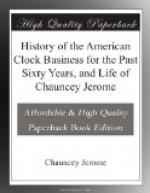One night I took one of these clocks into my room and placing it on the table, left a light burning near it and went to bed. While thinking over my business troubles and disappointments, I could not help feeling very much depressed. I said to myself I will not give up yet, I know more about the clock business than anything else. That minute I was looking at the wood clock on the table and it came into my mind instantly that there could be a cheap one day brass clock that would take the place of the wood clock. I at once began to figure on it; the case would cost no more, the dials, glass, and weights and other fixtures would be the same, and the size could be reduced. I lay awake nearly all night thinking this new thing over. I knew there was a fortune in it. Many a sensible man has since told me that if I could have secured the sole right for making them for ten years, I could easily have made a million of dollars. The more I looked at this new plan, the better it appeared. My business took me to South Carolina before I could return home. I had now enough to think of day and night; this one day brass clock was constantly on my mind; I was drawing plans and contriving how they could be made best. I traveled most of the way from Richmond by stage. Arriving at Augusta, Geo., I called on the Connecticut men who were finishing wood clocks for that market, and told Mr. Dyer the head man, that I had got up, or could get up something when I got home that would run out all the wood clocks in the country, Thomas’s and all; he laughed at me quite heartily. I told him that was all right, and asked him to come to Bristol when he went home and I would show him something that would astonish him. He promised that he would, and during the next summer when he called at my place, I showed him a shelf full of them running, which he acknowledged to be the best he had ever seen.
I arrived home from the south the 28th of January, and told my brother who was a first-rate clock maker what I had been thinking about since I had been gone. He was much pleased with my plan, thought it a first rate idea, and said he would go right to work and get up the movement, which he perfected in a short time so that it was the best clock that had ever been made in this or any other country. There have been more of this same kind manufactured than of any other in the United States. What I originated that night on my bed in Richmond, has given work to thousands of men yearly for more than twenty years, built up the largest manufactories in New England, and put more than a million of dollars into the pockets of the brass makers,—“but there is not one of them that remembers Joseph.”
CHAPTER V.
SUCCESS OF THE NEW INVENTION.—INTRODUCTION OF CLOCKS IN ENGLAND.—TERRY FAMILY, ETC.




